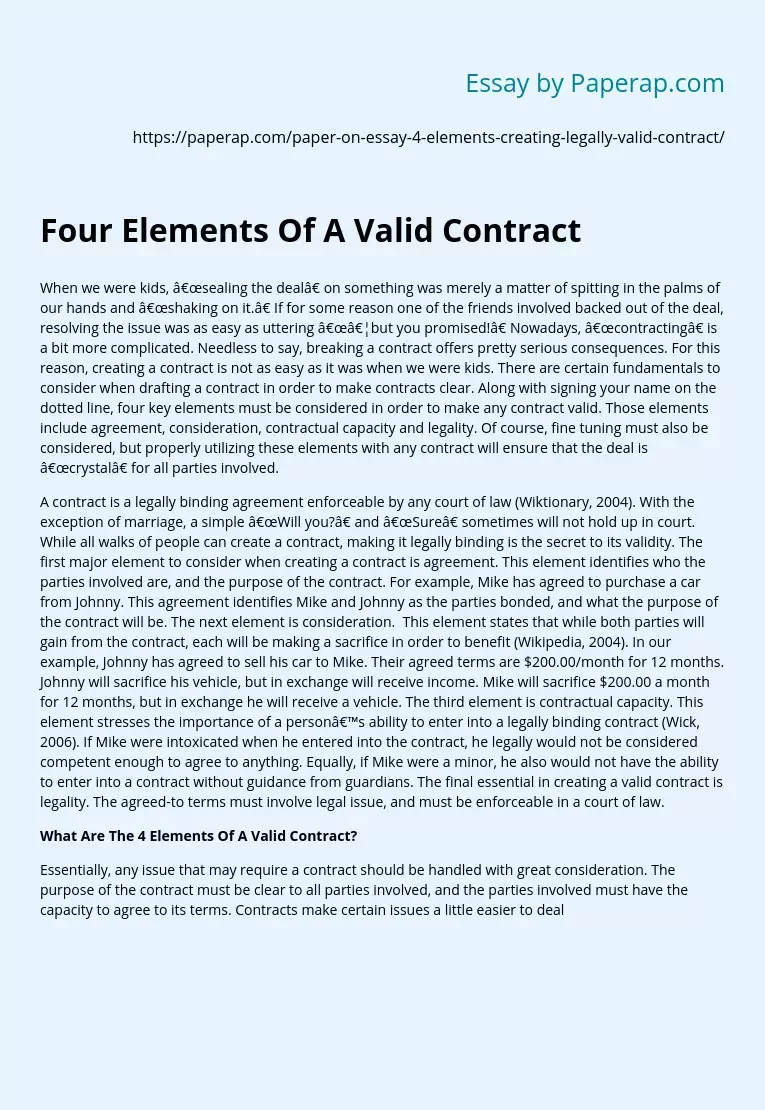Four Elements Of A Valid Contract
When we were kids, “sealing the deal” on something was merely a matter of spitting in the palms of our hands and “shaking on it.” If for some reason one of the friends involved backed out of the deal, resolving the issue was as easy as uttering “…but you promised!” Nowadays, “contracting” is a bit more complicated. Needless to say, breaking a contract offers pretty serious consequences.
For this reason, creating a contract is not as easy as it was when we were kids.
There are certain fundamentals to consider when drafting a contract in order to make contracts clear. Along with signing your name on the dotted line, four key elements must be considered in order to make any contract valid. Those elements include agreement, consideration, contractual capacity, and legality. Of course, fine-tuning must also be considered, but properly utilizing these elements with any contract will ensure that the deal is “crystal” for all parties involved.
A contract is a legally binding agreement enforceable by any court of law.
With the exception of marriage, a simple “Will you?” and “Sure” sometimes will not hold up in court. While all walks of people can create a contract, making it legally binding is the secret to its validity. The first major element to consider when creating a contract is agreed. This element identifies who the parties involved are, and the purpose of the contract. For example, Mike has agreed to purchase a car from Johnny. This agreement identifies Mike and Johnny as the parties bonded, and what the purpose of the contract will be.
The next element is a consideration. This element states that while both parties will gain from the contract, each will be making a sacrifice in order to benefit. In our example, Johnny has agreed to sell his car to Mike. Their agreed terms are $200.00/month for 12 months. Johnny will sacrifice his vehicle, but in exchange will receive income. Mike will sacrifice $200.00 a month for 12 months, but in exchange, he will receive a vehicle. The third element is contractual capacity. This element stresses the importance of a person’s ability to enter into a legally binding contract. If Mike were intoxicated when he entered into the contract, he legally would not be considered competent enough to agree to anything. Equally, if Mike were minor, he also would not have the ability to enter into a contract without guidance from guardians. The final essential in creating a valid contract is legality. The agreed-to terms must involve legal issue and must be enforceable in a court of law.
What Are The 4 Elements Of A Valid Contract?
Essentially, any issue that may require a contract should be handled with great consideration. The purpose of the contract must be clear to all parties involved, and the parties involved must have the capacity to agree to its terms. Contracts make certain issues a little easier to deal with, but without the proper elements, its creation could be futile.
Four Elements Of A Valid Contract. (2019, Dec 05). Retrieved from https://paperap.com/paper-on-essay-4-elements-creating-legally-valid-contract/

